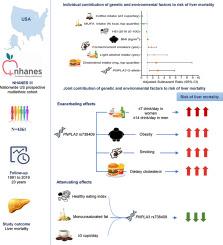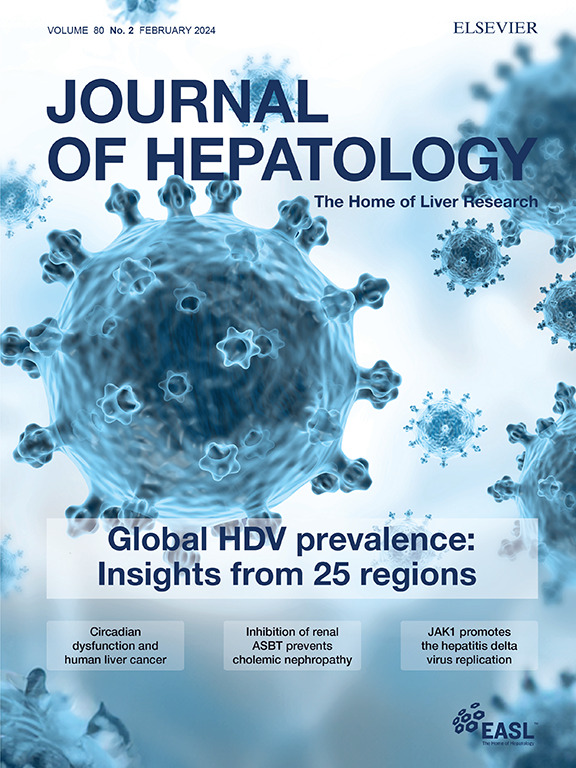美国人口中的 PNPLA3 rs738409、环境因素和肝脏相关死亡率
IF 33
1区 医学
Q1 GASTROENTEROLOGY & HEPATOLOGY
引用次数: 0
摘要
背景&目的人们对棒蛋白样磷脂酶结构域蛋白3(PNPLA3 rs738409 C>G)、环境因素和肝脏相关死亡(LRD)风险之间的相互作用知之甚少。所有参与者都与国家死亡指数建立了链接,直至 2019 年(平均随访时间:23.2 年)。LRD是研究结果。使用竞争风险回归模型研究了 PNPLA3、饮食、轻度酒精摄入量、吸烟和体重指数(kg/m2)与 LRD 的关系。结果PNPLA3 G-等位基因与 LRD 显著相关(调整后次危险比 [adj.sHR]:2.9,95% CI:1.4-5.8)。非大量酒精摄入量(adj.sHR:2.2,95% CI:1.1-4.5)、单不饱和脂肪(MUFA)最高四分位数(adj.sHR:0.43,95% CI:0.12-0.99)、胆固醇(adj.sHR:2.6,95% CI:1.00-8.8)、咖啡摄入量≥3 杯/天(adj.sHR:0.05,95% CI:0.06-0.10)、曾经/目前吸烟(adj.sHR:1.8,95% CI:1.2-2.6)、体重指数(adj.sHR:1.1,95% CI:1.03-1.2)和健康饮食指数(HEI)(adj.sHR:0.PNPLA3和环境因素之间的联合效应显示,非大量酒精摄入的G-等位基因携带者罹患LRD的风险显著增加(adj.PNPLA3与环境因素的联合效应显示,非大量饮酒(adj.sHR:3.7)、胆固醇摄入量较高(前四分之一)(adj.sHR:4.1)、曾经(adj.sHR:4.3)或目前(adj.sHR:3.5)吸烟或体重指数≥30(adj.sHR:4.0)kg/m2的G等位基因携带者的LRD风险明显增加。G-等位基因对 LRD 风险的影响在 MUFA 消费量居前四分之一(adj.sHR:0.5)或咖啡饮用量≥3 杯/天(adj.sHR:0.09)的人群中明显减弱。在所有 PNPLA3 基因型中,HEI 与 LRD 都呈反比关系(CC、CG 和 GG 的 adj.sHR 分别为 0.94、0.96 和 0.97)。本文章由计算机程序翻译,如有差异,请以英文原文为准。


PNPLA3 rs738409, environmental factors and liver-related mortality in the US population
Background & Aims
Little is known about the interplay between patatin-like phospholipase domain-containing protein 3 (PNPLA3 rs738409 C>G), environmental factors, and the risk of liver-related death.
Methods
A total of 4,361 adults were selected from NHANES III, 1991–1994. All participants were linked to the National Death Index until 2019 (mean follow-up: 23.2 years). Liver-related death was the study outcome. Associations of PNPLA3, diet, light alcohol intake, smoking, and BMI (kg/m2) with liver-related death were examined using competing risk regression models.
Results
The PNPLA3 G-allele was significantly associated with liver-related death (adjusted subhazard ratio [adj.sHR] 2.9, 95% CI 1.4-5.8). Light alcohol intake (adj.sHR 2.2, 95% CI 1.1-4.5), top quartiles of monounsaturated fat (adj.sHR 0.43, 95% CI 0.12-0.99) and cholesterol (adj.sHR 2.6, 95% CI 1.00-8.8), coffee intake ≥3 cups/day (adj.sHR 0.05, 95% CI 0.06-0.10), former/current smoking (adj.sHR 1.8, 95% CI 1.2-2.6), BMI (adj.sHR 1.1, 95% CI 1.03-1.2), and healthy eating index (adj.sHR 0.96, 95% CI 0.93-0.98) were associated with liver-related death. Joint effects between PNPLA3 and environmental factors showed that the risk of liver-related death was significantly increased in carriers of the G-allele with light alcohol intake (adj.sHR 3.7), higher consumption (top quartile) of cholesterol (adj.sHR 4.1), former (adj.sHR 4.3) or current (adj.sHR 3.5) smoking, or BMI ≥30 (adj.sHR 4.0) kg/m2. The effects of the G-allele on the risk of LRD were significantly attenuated in those with top quartile consumption of monounsaturated fat (adj.sHR 0.5) or coffee intake ≥3 cups/day (adj.sHR 0.09). Healthy eating index was inversely associated with liver-related death across all PNPLA3 genotypes (adj.sHR 0.94, 0.96, and 0.97 for CC, CG, and GG, respectively).
Conclusions
PNPLA3 is associated with liver-related death and this relationship is significantly modified by anthropometric and environmental factors.
Impact and implications
Light alcohol intake, dietary factors (healthy eating index, monounsaturated fat, cholesterol), coffee intake, smoking status, and BMI are independently associated with the risk of liver-related death. The increased inherited risk of liver-related death associated with PNPLA3 rs738409 appears to be attenuated by healthy eating index, monounsaturated fat, and coffee intake, and exacerbated by light alcohol intake, smoking, and BMI. Reducing harmful environmental exposures and increasing healthy eating habits may help mitigate the risk of liver-specific mortality even in those with high genetic risk.
求助全文
通过发布文献求助,成功后即可免费获取论文全文。
去求助
来源期刊

Journal of Hepatology
医学-胃肠肝病学
CiteScore
46.10
自引率
4.30%
发文量
2325
审稿时长
30 days
期刊介绍:
The Journal of Hepatology is the official publication of the European Association for the Study of the Liver (EASL). It is dedicated to presenting clinical and basic research in the field of hepatology through original papers, reviews, case reports, and letters to the Editor. The Journal is published in English and may consider supplements that pass an editorial review.
 求助内容:
求助内容: 应助结果提醒方式:
应助结果提醒方式:


